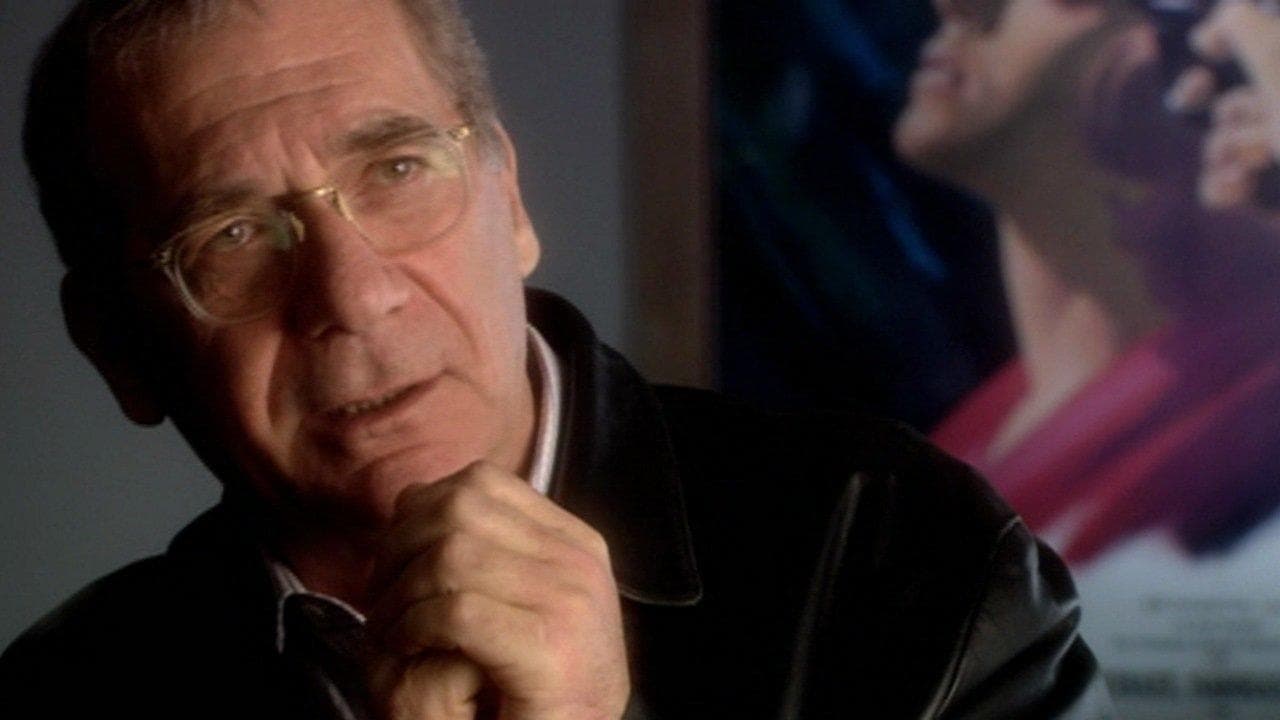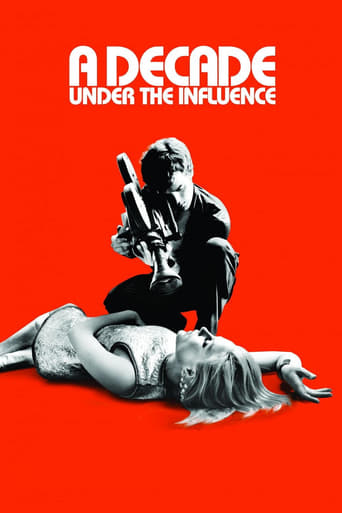

This exploration of a unique decade in US cinema begins with the fall of one ailing, out-of-touch empire and culminates with the unstoppable rise of another, equally associated with escapism and box office receipts. Meet the new boss, same as the old boss. Or, as Peter Fonda observed in Easy Rider, "We blew it." In between, from Bonnie And Clyde to Star Wars, the young Turks (some under the guerrilla tutelage of Roger Corman) were creeping under the wires to produce some of the greatest artworks of the 20th century. While the story is already familiar from Peter Biskind's Easy Riders, Raging Bulls directors Demme and LaGravenese are less concerned with muckraking than in providing a platform for the filmmakers and stars themselves.Everyone from Martin Scorsese to Francis Ford Coppola and Julie Christie is interviewed and a roster of well edited clips places the decade in a socio-cultural and economic context. If their responses are self-congratulatory (to say the least), they're also highly quotable, funny and revealing, making this something of a cinephile's wet dream. Director William Friedkin reveals how the original The Exorcist poster was to feature a little girl's hand holding a bloodied crucifix and the legend 'For God's sake, help her", before he complained. Former Warner Bros.' head John Calley recalls that when he first saw Robert De Niro in Mean Streets he assumed Scorsese had secured a psychopath's day release for the shoot.Happily, a certain amount of hard perspective has crept into the mix, as might be hoped from a politically motivated, consciousness-expanded generation; Hopper stresses "there's a lot of real crap in there too". Julie Christie observes that 1970s US cinema was "not a good time for women". But if Demme responds with a spoonful of sops to women's movies - brief clips of Alice Doesn't Live Here Anymore, They Shoot Horses, Don't They and Klute - we're soon dragged back to the usual male wall-pissing contests.The shift from tough, socially-conscious film-making to no-risk crowd-pleasers like Jaws for 'Nam-weary, fantasy-craving audiences is also documented, though a little rushed. But kudos too, for the inclusion of lesser-sung, but equally relevant films like Panic In Needle Park and Joe. "We weren't handsome," muses Bruce Dern on his contemporaries. "But we were f****** interesting."
... View MoreWhat a wonderful documentary - I sat down thinking this would be a rehash of the bitchy stories told in Easy Riders, Raging Bulls, but it is, in fact, a clear-eyed, glorious celebration of a strange and twisted era that spawned some truly great movies. What struck me was the lack of bitterness apparent in the director interviews, given that now the movie business sucks in a large fashion - instead, folk like Friedkin and Coppola's eyes seem to positively glitter recalling their glory days. The footage of an audience coming out of a daytime screening of the Exorcist was priceless. 'It was - traumatic,' one guy says. A great epitaph for the late Ted Demme, a thrilling film, I just wish it was longer - I could have sat through a three hour cut of this.
... View MoreWhen an artist, particularly a popular artist creates a work, it is not a matter of them creating something which we can then encounter or not. There is a constant collaboration back and forth, a synthesis of preconceptual stuff that is exchanged. The artist creates tentative forms that will be received by us and affect us, and to do that he has to enlist our help as cocreator.It is a complex business and the rules are always changing. No one fully understands what is going on, so usually intuition is what everyone relies on. Movies are more complex than other art forms, and they are younger by a far stretch. No decent film theorist has yet emerged.Even with the high cost of production, there is so much money in the game that there is lots of room for trial and error. And that's how things happen.How quickly we forget that all of our celebrated filmmakers, especially those featured here, had some really, really big failures. And until these dogs were sent out, they thought they were as terrific as the things that we now endorse.The point is that when it comes to explaining things, these might be the very last people to ask, and whose answers may be the least trustworthy.Yes, it probably helps to know what Scorsese now thinks was in his mind when he did something thirty years ago. And it is useful to know some of the factual history about funding and who introduced whom.But none of that gets us closer to understanding film in the 70s. No one knows what the stock market is doing, but everyone seems to have a plausible explanation afterward. I know that Hopper and Schrader have more interesting opinions than expressed here I've heard them. Those opinions are of the type I credit and have to do with constructed reality. But none of that will be found in this high school level discussion.Look, these are professional storytellers. They've been explaining themselves all their lives, so they've constructed plausible stories about what happened and why. You can't see it here, but if you dig deeper into individual views, you'll find that each person's vision of the real world corresponds to that of the constructed worlds they create.Scorsese believes the whole world is spun by personality. Schrader believes that drug-addled artists can stumble upon an accidental creation if their passion is great enough. Hopper's world is one in which a noir fate simply lays accidents of insight here and there, and so on.Demme was the wrong man to ask these questions. Of major American filmmakers, only one has exhibited his independence from the internal/external trap: Woody Allen. When he does something like this, we should all listen. Meanwhile, stuff like this only confuses history and understanding.Ted's Evaluation -- 1 of 3: You can find something better to do with this part of your life.
... View More...and my reasons for which are simple- there are so many great films presented and discussed here (most of them by their own directors and stars), so many clips of infamous moments in 70's movie history, and in fact a number of films I have yet to see, that it wouldn't be fair to grade this work. By this logic I shouldn't have given grades to other movie documentaries like Martin Scorsese's Personal Journey through American Movies and My Voyage to Italy. But while those films were on the basis of one man's view of cinema, narrating through most of the way, Richard LaGravanese and (the late) Ted Demmes' A Decade Under the Influence lets the films and the creators speak entirely for themselves. What makes 'Decade' worth at least one watch for film buffs, or just anyone who likes the films of the late 60's-70's in America, are the levels that it goes to, that in the uncut version (three hours, not the theatrical version, which I have no comment on) plenty of ground is covered. Interviews include the likes of Scorsese, Robert Altman, Sidney Lumet, Julie Christie, Jon Voight, Francis Ford Coppola, Paul Schrader, Pam Grier, Bruce Dern, Peter Bogdanovich, Roger Corman, Dennis Hopper, Robert Towne, etc, and there's a constant flow of insight from start to finish. The way the clips and directors/actors pop up, edited together in a flashy and quick style, is also fascinating. The one down comment I have on the documentary is that most of the information presented has been reported on in various books, like Easy Riders, Raging Bulls, and though I haven't seen the movie version of that book yet I'm sure it would have covered many of the films and directors and incidents as here (in fact, the book of that is one of the best I've ever read. HOWEVER, this documentary serves as something special for film buffs and occasional movie goers of the future- they can look at this and learn not only about such well known pictures as Easy Rider, The Last Picture Show, Annie Hall, Coming Home, and lessor knowns like Scarecrow, Panic in Needle Park, The Landlord, Joe, They Shoot Horses Don't They. They can also learn about who influenced them (new waves of Europe and Asia), who they served as influences for, and how the subject matter that created controversy after controversy still serves as intriguing and chancy material for the contemporary crowd. Seek this out!
... View More